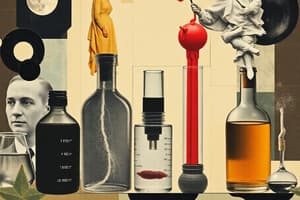Podcast
Questions and Answers
What is the purpose of a hypothesis in the scientific method?
What is the purpose of a hypothesis in the scientific method?
- To compile evidence supporting a scientific theory
- To draft a research proposal for funding
- To create a statement that can be tested (correct)
- To provide a conclusion based on observations
How does a scientific theory differ from a scientific law?
How does a scientific theory differ from a scientific law?
- A law must always be true, while a theory can be disproven. (correct)
- A theory can include quantitative elements; a law cannot.
- A theory is about single observations; a law encompasses multiple conclusions.
- A theory explains why something is true; a law only states that it is true. (correct)
Which of the following describes a characteristic of models in scientific knowledge development?
Which of the following describes a characteristic of models in scientific knowledge development?
- Models are not essential for understanding complex systems.
- Models are only used for visual representation.
- Models must always be built on physical experimentation.
- Models have predictive power and explanatory abilities. (correct)
What distinguishes simulations from traditional models?
What distinguishes simulations from traditional models?
What is a conceptual model primarily used for?
What is a conceptual model primarily used for?
Which of the following is NOT a type of model mentioned?
Which of the following is NOT a type of model mentioned?
What type of question is focused on understanding or explaining phenomena?
What type of question is focused on understanding or explaining phenomena?
Which of the following characteristics define a good scientific question?
Which of the following characteristics define a good scientific question?
In an experiment, which variable is manipulated by the researcher?
In an experiment, which variable is manipulated by the researcher?
Which type of variable is kept constant throughout an experiment?
Which type of variable is kept constant throughout an experiment?
In a graph representing an experiment, the independent variable is typically plotted on which axis?
In a graph representing an experiment, the independent variable is typically plotted on which axis?
What role do confounding variables play in an experiment?
What role do confounding variables play in an experiment?
Which of the following best describes a dependent variable?
Which of the following best describes a dependent variable?
What is the purpose of experimental controls in scientific experimentation?
What is the purpose of experimental controls in scientific experimentation?
Which question type is least focused on experimental manipulation?
Which question type is least focused on experimental manipulation?
What is the role of extraneous variables in an experiment?
What is the role of extraneous variables in an experiment?
What distinguishes a positive control group from a negative control group?
What distinguishes a positive control group from a negative control group?
How did Oswald Avery contribute to the understanding of genetic properties?
How did Oswald Avery contribute to the understanding of genetic properties?
Which of the following is NOT a characteristic of a good scientific experiment?
Which of the following is NOT a characteristic of a good scientific experiment?
What does the acronym CER stand for in the context of argumentative writing?
What does the acronym CER stand for in the context of argumentative writing?
What is the primary purpose of data visualization?
What is the primary purpose of data visualization?
Why is it important to control variables in an experiment?
Why is it important to control variables in an experiment?
What should be the focus when answering questions based on graphs or charts?
What should be the focus when answering questions based on graphs or charts?
Which of the following best describes a moderator variable?
Which of the following best describes a moderator variable?
What is an effective structure of an argumentative essay?
What is an effective structure of an argumentative essay?
Flashcards are hidden until you start studying
Study Notes
Scientific Questions
- A scientific question is objective and testable.
- A good scientific question is specific and has a clear focus.
- It focuses on an independent variable and a dependent variable.
- A scientific question can be answered using measured or observed data.
Scientific Experiments
- A scientific experiment uses the scientific method.
- Scientists manipulate the independent variable and measure the dependent variable.
- Controlled variables are kept constant throughout an experiment.
- Controls are used to assess the validity of the experiment.
Variables
- The independent variable is manipulated by the researcher, and the dependent variable changes as a result.
- Independent variables are often denoted as 'x', while dependent variables are denoted as 'y'.
- Confounding variables can influence the relationship between the independent and dependent variables.
- Extraneous variables are any factor that might affect the dependent variable, such as demand characteristics or experimenter effects.
- Control variables are kept consistent for all participants, while moderator variables can influence the strength of the relationship between the independent and dependent variables.
Control Groups
- Experiments have at least one control group and one test group.
- The control group provides a standard for comparison.
- Positive controls receive a treatment that is expected to elicit a response, while negative controls receive no treatment.
- Placebos are a common type of negative control.
Scientific Experiment Design
- A good scientific experiment answers a question, provides objective results, and controls for multiple variables.
- Frederick Griffith's experiments led to the discovery of a transforming principle.
- Oswald Avery designed an experiment to identify the transforming principle, controlling for multiple variables and providing objective results.
- Avery's work demonstrated that DNA was the transforming principle.
Understanding Data Tables
- Scan the table before reading the questions to understand the data.
- Verify the concepts presented in the table.
- Try to answer the question on your own before looking at the choices.
Interpreting Graphs and Charts
- Orient yourself to the x- and y-axes and understand the units.
- Identify the trends in the data.
- Try to answer the question without looking at the answer choices.
Data Visualization
- Different types of data visualizations are suitable for different types of data.
- Bar graphs are useful for discrete categories, while line graphs show changes over time.
- Pie charts represent data categories that make up a whole.
Argumentative Essays
- Argumentative essays contain a claim (argument), reasons, evidence, and counterclaims.
- The standard format is an introduction, body paragraphs, and a conclusion.
- An effective argument addresses the audience's needs and concerns.
CER (Claim, Evidence, Reasoning)
- A claim answers a question and is supported by evidence and reasoning.
- Evidence is factual information that supports the claim.
- Reasoning explains how and why the evidence supports the claim.
The Scientific Method
- The scientific method includes observation, questioning, research, hypothesis formation, experimentation, data analysis, and concluding.
- A hypothesis is a testable statement.
- A scientific theory is supported by a large body of research and explains a phenomenon.
- A scientific law describes how something is true, often using mathematical formulas.
Models and Simulations
- Models are used to understand complex systems.
- Models can be used to predict future events through simulations.
- Models are used to explain and predict, and must be consistent.
- There are mental, expressive, and consensus model types.
Conceptual Models
- Conceptual models are used to simplify systems and concepts.
- They are often visual and involve abstraction.
- Conceptual models are used across diverse fields.
- They provide a shared understanding and reference point for future use.
Studying That Suits You
Use AI to generate personalized quizzes and flashcards to suit your learning preferences.




